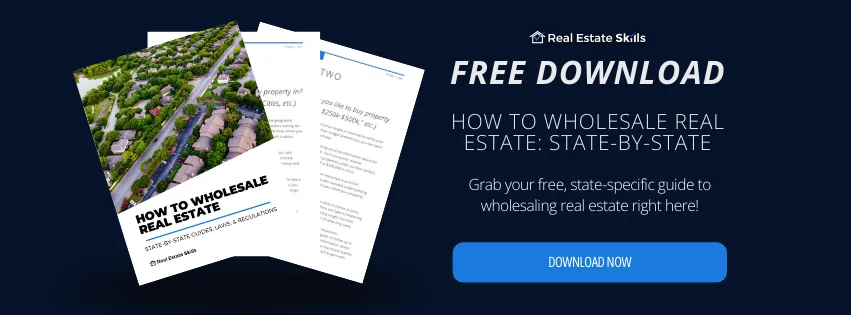Wholesale Real Estate: How It Works, Examples, & Step-By-Step Guide
Jan 13, 2026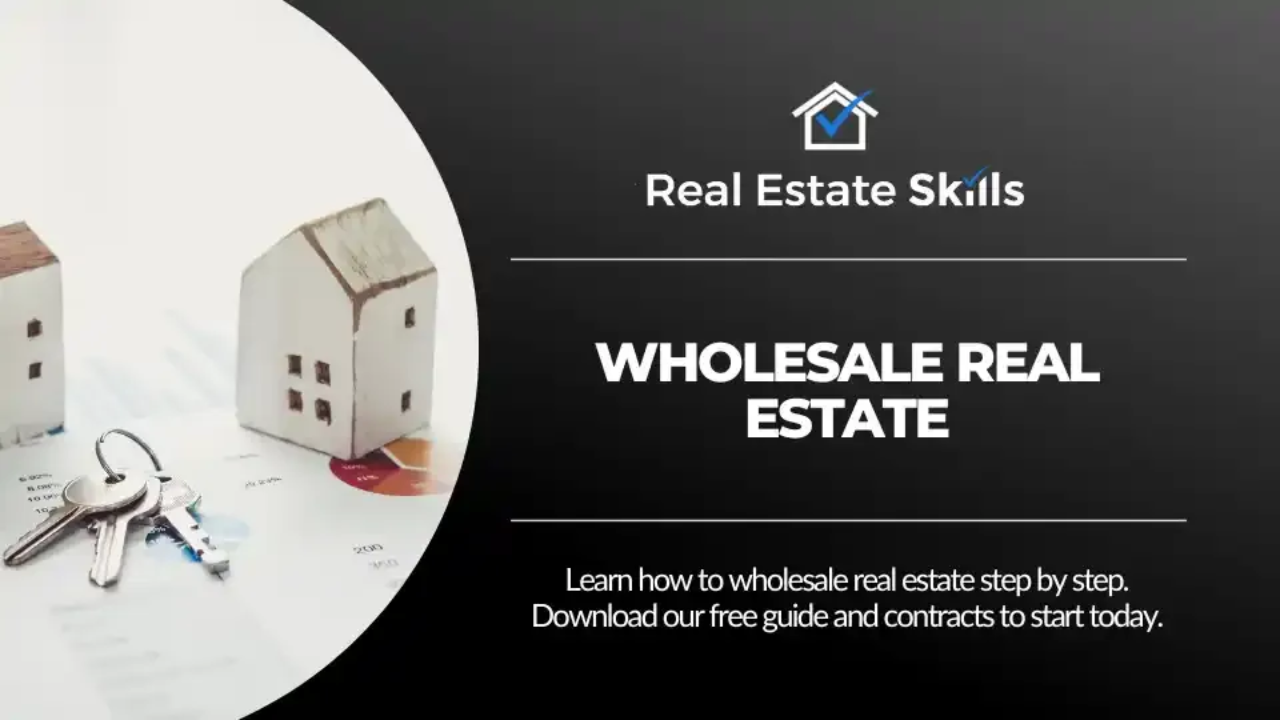
Key Takeaways: Real Estate Wholesaling Guide
- What is Wholesaling Real Estate, Exactly? Real estate wholesaling is the process of securing a purchase contract on a home and assigning that contract to another buyer, typically a fix-and-flipper, for a profit.
- Why Wholesale Real Estate? This strategy is the perfect entry point for beginner investors. You can get started with little to no experience and without any upfront capital.
- How Does Wholesaling Work? A wholesaler finds a distressed property in need of fixing up. They will get the property under contract below-market value. Then, the wholesaler sells the contract rights to a cash buyer. Finally, the wholesaler gets paid an "assignment fee."
Maybe you’ve heard of wholesale real estate and how it’s a great way to make money in this industry, but maybe you don’t know exactly what it is yet or how it works.
Well, what I can tell you is that wholesaling is the perfect way to get started in real estate and was actually how I got my start over a decade ago.
I went from knowing nothing about real estate to actually doing my first wholesale deal in about 45 days, where I got my first house under contract at $328,000 and wholesaled that contract to another buyer at $350,000.
This was without putting any money into the deal, without a real estate license, and without ever swinging a hammer! Since then, my partners and I’ve done a lot more wholesale deals, house flips, and we also love to invest in rental properties across the US.
So, since wholesaling has made such a huge impact on my life, I want to share some golden nuggets in this guide on:
- Wholesale Real Estate Definition
- Wholesaling Real Estate Example
- How To Wholesale Real Estate In 8 Steps
- Wholesaling Real Estate Example
- Pros & Cons Of Wholesaling Real Estate
- Expert Wholesaling Tips For Beginners
- How To Start Wholesaling Real Estate In Your Area
- Wholesaling Real Estate: FAQs
If you’re serious about doing your first real estate deal, don’t waste time guessing what works. Our FREE Training walks you through how to consistently find deals, flip houses, and build passive income, without expensive marketing or trial and error.
This FREE Training gives you the same system our students use to start fast and scale smart. Watch it today—so you can stop wondering and start closing.
What Is Wholesale Real Estate?
💡 Quick Definition: Wholesaling real estate is the process of securing a property under contract and assigning those contractual rights to a new buyer for a fee. You are flipping the paperwork, not the physical house, and you never take title to the property.
Wholesale Real Estate is a real estate investing strategy where the contractual rights to buy a property are sold to an end buyer, typically a fix & flipper, rather than the actual property itself.
So, as a real estate wholesaler, you are not selling the property; you are selling the contract that includes the rights to buy it.
Now, you may not fully grasp wholesale real estate at this point, but don’t worry, I’ll break it down with examples and exactly how it works:
The average day for a real estate wholesaler goes like this:
- The wholesaler finds a distressed property that needs fixing
- The wholesaler gets the house under contract (preferably below market value)
- Then, the Wholesaler sells the contract rights to a buyer who will fix & flip the house
- Finally, the wholesaler gets paid a wholesale fee (or assignment fee), which is the difference between what the wholesaler got the house under contract at and the price the end buyer bought the property at.
That’s “wholesale real estate” in a nutshell!
Why Should You Wholesale Real Estate?
Yes, this strategy can make you active income, but it's also the most beginner-friendly way to get into real estate. Here are just a few benefits that make wholesaling real estate so exciting:
- You don’t have to put any money into the deal. This is great because when I started out, I had a lot of school debt and didn’t have a lot of money.
- You can have little to no risk. This is because you are not actually buying the property; you are just putting it under contract. If you are smart with your contracts, then you’ll have a backout clause (called a “contingency” in the real estate world) that allows you to back out of the deal, risk-free, and not have to close on it if you or your cash buyer changes their mind.
- Wholesaling doesn't require a real estate license. Real estate licenses can sometimes take 6 months to get and have fees associated with them. The great thing is that you can wholesale real estate without a real estate license, which allows you to get started immediately.
Wholesale Is Best Suited For:
- Beginners with limited capital: Only a small earnest money deposit and marketing budget are typically needed.
- Networkers and negotiators: Success often comes from building strong relationships with sellers, buyers, and agents.
- Investors seeking quick returns: Many wholesale deals close in 30 days or less.
- Problem-solvers: Helping distressed owners find a win-win solution is a core skill.
Who Should Reconsider Wholesaling:
- Those seeking passive income: Wholesaling is active, high-energy work, not a “set it and forget it” strategy.
- People uncomfortable with sales or negotiation: Deals hinge on direct communication and persuasion.
- Those unable to handle time pressure: Contracts have strict deadlines; delays can kill deals.
Wholesaling Real Estate Example
- Let’s say you find a homeowner who wants to sell their house for $90,000.
- You sign a contract with them, but you do not buy the house yourself. The contract gives you the right to buy the house.
- Next, you find a buyer who will pay more, like $100,000. You give the contract to that buyer. The house is still bought for $90,000, but the buyer pays $100,000.
- The extra $10,000 is your fee. You earn $10,000 on the deal.
If You Want to Start Wholesaling Real Estate Today, Download This Free Guide First
If you're ready to take action but aren't sure where to begin, we’ve created a free downloadable resource to help you start wholesaling real estate the right way. Our How To Wholesale Real Estate & Legalities Guide gives you the contracts, step-by-step breakdowns, and legal insights you need to wholesale deals with confidence—no guesswork required.
Wholesale Legally in Any State: Your 2026 Compliance Roadmap
Whether you are operating in a strict regulatory environment or a high-velocity metro market, staying compliant is the foundation of a long-term investment career.
We teach you how to wholesale legally in any state, no matter where you are, giving you the specific legal structures and technical transparency needed for the current year.
Start today with this guide to audit-proof your business and ensure every deal you analyze is backed by a bulletproof legal strategy.
How To Start Wholesaling Real Estate (8 Steps)
- Start Your Journey With A Trusted Wholesale Mentor
- Learn Wholesaling Laws, Regulations, & Agreements
- Research Your State's Real Estate Market Trends
- Build A Cash Buyers List
- Discover Distressed Properties & Tap Into Motivated Seller Leads
- Submit Offers & Put Properties Under Contract
- Secure An End Buyer From Your Buyers List
- Seal The Deal & Get Paid

1. Start Your Journey With A Trusted Wholesale Mentor
A wholesale real estate mentor can teach you each step, like how to find deals and how to close them and make money. Articles and videos can help, but it is even better to learn from someone who has done lots of wholesale deals.
Why Work With a Mentor?
- Avoid big mistakes: You learn what works and don’t waste time or money on common beginner mistakes.
- Learn helpful tips: You get advice for your area, plus contract templates and negotiation tips you might not find online.
- Use their connections: A mentor may introduce you to good buyers, sellers, title companies, and contractors.
- Feel more confident: An expert can look at your deals and help you make smart, safer choices.
*Pro Tip: Many successful wholesalers say a mentor helped them get their first big win by teaching them how to analyze deals, negotiate, and build a buyer list. Getting the right help early can make you grow much faster!
Ready To Get Started? Apply To Join The Real Estate Skills Pro Wholesaler Program!
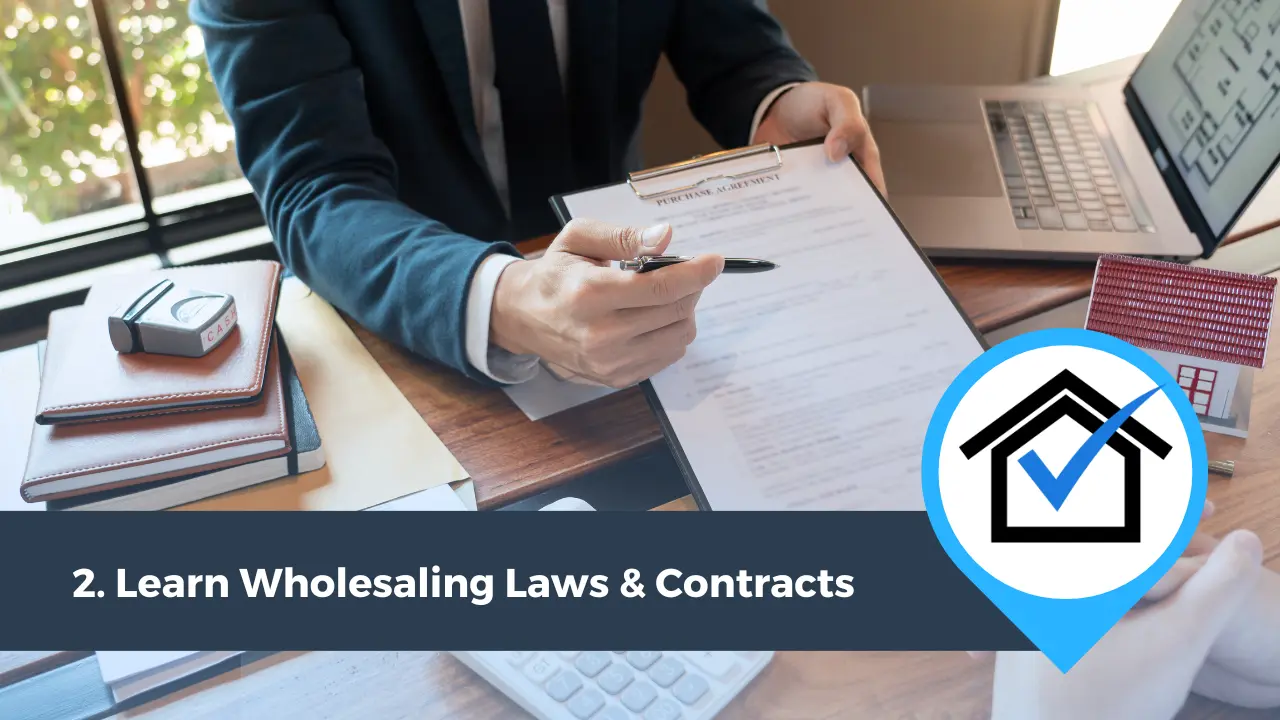
2. Learn Wholesaling Laws, Regulations, & Agreements
Successful wholesalers make sure every deal is ethical, legal, and fully compliant. Wholesaling regulations can vary widely from state to state. For example, California’s wholesaling laws are different from Texas, Florida, or any other market.
Understanding these laws protects your business, your reputation, and your long-term success.
Why Legal Knowledge Matters
- Avoid legal trouble: Non-compliance can result in fines, lawsuits, or being barred from certain transactions.
- Build trust: Ethical, transparent deals make you a preferred partner for sellers, buyers, and agents.
- Close faster: Knowing exactly what’s required in your state reduces delays and contract issues.
How to Learn the Rules in Your Market
- Review your State Real Estate Commission website for licensing and advertising rules.
- Check HUD (U.S. Department of Housing & Urban Development) and NAR (National Association of Realtors) for compliance guidelines.
- Understand the difference between assignment of contract and double closing, and when each is allowed.
- Work with a real estate attorney experienced in wholesaling to review contracts before use.
To stay compliant, regularly check federal and REALTOR® resources:
- HUD’s RESPA Statement of Policy 2001-1 — for guidelines on unearned fees and settlement practices
- HUD Lender’s Guide (4155.2) — for fairness standards in closing and cost disclosures
- NAR Internet Advertising Policy — for marketing transparency rules
- NAR Multiple Listing Policy Updates — for MLS marketing compliance
Key Agreements Every Wholesaler Should Know
- Purchase & Sale Agreement (PSA): The main contract between you and the seller.
- Assignment of Contract: Transfers your contractual rights to the end buyer for a fee.
- Joint Venture (JV) Agreement: Used when partnering with another wholesaler on a deal.
- Non-Circumvention Agreement: Protects your relationship with sellers and buyers from being bypassed.
*Pro Tip: Keep a “legal compliance” checklist in your CRM or deal tracker. Before marketing or assigning any property, confirm all disclosures, contracts, and state-specific requirements are complete.
Download Our FREE Advanced Wholesale Contract Bundle! (Attorney-Approved Contracts for Wholesaling In Any State)

3. Research Your State's Real Estate Market Trends
Success in real estate wholesaling requires understanding your local real estate market. Profitable wholesale deals come from your ability to read, predict, and act based on market trends. Successful investors capitalize on emerging opportunities while minimizing risk.
- Start by diving deep into local demographics. It's more than just numbers; it's about understanding the fabric of the community.
- Population growth trends, employment statistics, and key economic markers will shine a light on the state's economic health, helping you foresee the demand for wholesale properties.
- Understand supply and demand dynamics in the area. This clarity allows you to tailor your approaches to the specific needs of sellers and buyers in the area.
- Use online platforms, like the National Association of Realtors (NAR) and other reliable real estate data sources.
- Engage with Realtors, property managers, and fellow investors. Their first-hand market experiences can guide you toward ripe opportunities and away from potential pitfalls.
Remember, knowledge isn't just power; it's profit!
Read Also: The Best States To Wholesale Real Estate

4. Build A Cash Buyers List
Your cash buyers list is the engine that keeps your wholesale real estate business running. Without ready and willing wholesale buyers, even the best property deals can stall. The bigger, more engaged, and more qualified your list, the faster you can close, and the more deals you can do.
How to Find Cash Buyers for Wholesale Real Estate
- Engage in Targeted Outreach: Use focused email campaigns to reach investors who match your property types and locations. Segment your list by investment criteria for better response rates.
- Network at Local Events: Attend real estate investor meetups, REI clubs, and auctions. Exchange business cards and follow up within 24 hours to build trust.
- Create a Digital Presence: Launch a simple, SEO-optimized website with clear calls to action for investors to join your list. Include property previews or case studies to boost credibility.
- Use Proven Traditional Marketing: Cold-calling and strategically placed bandit signs still work. Place signs in high-traffic areas near investment-friendly neighborhoods.
- Leverage Social Media: Join Facebook investor groups, LinkedIn real estate communities, and Instagram REI pages. Share deals (within legal guidelines) and engage with active buyers.
- Run Direct Mail Campaigns: Send postcards or letters to known investors and recent cash buyers from public records. Keep your message concise and benefit-driven.
Nurture Your Wholesale Buyers List
Once you’ve built your list, keep it warm with consistent, value-driven communication. Share market trends, investment tips, and new deal alerts. The goal is to become your buyers’ first call when they’re ready to purchase.
Vet Your Buyers Before Closing
- How quickly can they close?
- Do they have a proven track record with wholesalers?
- What’s their exit strategy for the property?
- Do they have verified proof of funds?
Watch: How To Find Cash Buyers For Wholesale Deals
Mastering Wholesale Real Estate requires more than just finding a property; it requires a deep list of active investors who can close with speed. This training breaks down the Google Ninja Trick to find local fix-and-flippers who are already spending money to find deals in your specific market, allowing you to build a high-quality list without expensive software.
A strong, well-managed buyers list doesn’t just help you close deals; it makes you a valuable connector in your market.
Build it, nurture it, and protect it, and your wholesaling business will have a competitive edge for years to come.
Download Now: How To Talk To & Secure Cash Buyers For Your Wholesale Deals!

5. Discover Distressed Properties & Tap Into Motivated Seller Leads
Distressed properties and motivated sellers are the foundation of profitable wholesale real estate deals. They often offer below-market pricing and faster closing timelines—two key ingredients for a successful assignment or double close.
Why Target Distressed Properties?
Distressed homes are typically in need of significant repairs, making them less attractive to retail buyers. Because of this, they can be purchased well below fair market value. Once renovated, these properties can see dramatic increases in value, allowing wholesalers to create deals with large profit margins for end buyers.
Why Work with Motivated Sellers?
Motivated sellers—whether facing foreclosure, probate, relocation, divorce, or financial hardship—often prioritize speed and certainty over top-dollar offers. This urgency creates opportunities for wholesalers to negotiate favorable terms while helping the seller solve a pressing problem.
Proven Strategies to Find Distressed Properties & Motivated Sellers
- Start Your Search Online: Use free platforms like Craigslist, Facebook Marketplace, and local classifieds. Consider paid foreclosure and auction listing services for exclusive leads.
- Boost Your Digital Presence: Maintain a professional website with an easy “Sell Your House Fast” form. Post regularly on social media to attract both sellers and buyers.
- Drive for Dollars: Physically scout neighborhoods for vacant, neglected, or overgrown properties. Record addresses and contact owners directly.
- Direct Mail Campaigns: Send postcards or letters to owners of distressed properties, absentee landlords, or homeowners with delinquent taxes.
- Network with Industry Pros: Build relationships with real estate agents, property managers, and contractors. They often know about deals before they hit the market.
- Leverage the MLS: Partner with a licensed agent to search for properties labeled as “fixer-upper,” “needs TLC,” or “as-is.”
- Attend Auctions: Check local and bank-run auctions for discounted properties, especially REOs (real estate owned by banks).
- Research Title Chains: Visit your local Recorder’s Office to identify properties with multiple liens, ownership disputes, or foreclosure filings.
- Use Government Resources: Explore local housing department and economic development websites for foreclosure lists or distressed property databases.
By combining online tools, in-person scouting, and strong networking, you can consistently source high-quality wholesale opportunities. Every distressed property or motivated seller you uncover could be the next win-win deal that grows your business.
Read Also: How To Find Distressed Properties: 10 Best Strategies For Real Estate Investors
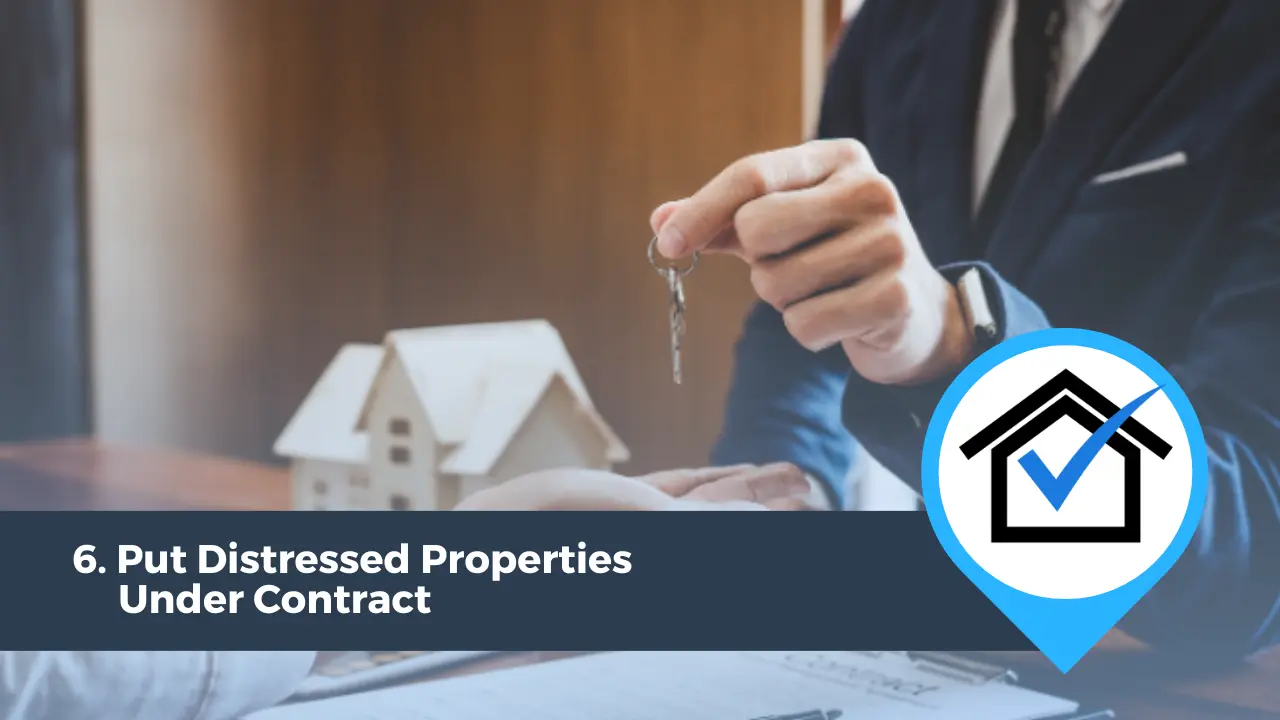
6. Submit Offers & Put Properties Under Contract
Once you’ve identified a strong lead, a distressed property with a motivated seller, the next step is turning that lead into a legally secured opportunity.
In wholesale real estate, success often comes down to making the right offer at the right time and locking it in with a well-structured contract.
How To Submit Wholesale Offers & Put Properties Under Contract
- 📊 Crunch the Numbers
- 🔥 Draft a Strong Offer
- ⚖️ Use the Right Contracts
- 🔎 Account for Adjustments
Step 1: Crunch the Numbers
Start by calculating the After Repair Value (ARV) based on comparable recent sales. Then, determine your Maximum Allowable Offer (MAO)—the highest price you can offer while still leaving room for your assignment fee and your end buyer’s profit margin. Use our free wholesale deal calculator to speed up the process.
The ARV can be broken down into a simple formula: ARV = Property Value Before Renovations + Value Of Renovations
After-Repair-Value (ARV) Calculator
Step 2: Draft a Strong Offer
Your offer should clearly state the purchase price, contingencies, and closing terms. Include a modest Earnest Money Deposit (EMD) to show commitment and build trust. Ensure the numbers make sense for all parties: the seller, the end buyer, and you.
Step 3: Use the Right Contracts
In wholesaling, your paperwork does more than agree on a sale—it gives you the legal right to control the property and transfer that right to another buyer. Two main contracts are used:
- Wholesale Purchase Agreement: Outlines property details, price, financing terms, contingencies, and closing date. Always include inspection and financing contingencies to protect yourself.
- Assignment of Contract: Allows you to transfer your purchase rights to an end buyer. It should include the original purchase agreement for transparency and clearly state your assignment fee.
Download our free wholesale real estate contract template for reference.
Step 4: Account for Adjustments
Well-written contracts allow for prorated property taxes, utility adjustments, and other closing costs. This ensures there are no surprises at the closing table.
Submitting offers in wholesale real estate is a balance of accurate valuation, clear communication, and airtight contracts. When you master the numbers and paperwork, you’ll be able to move quickly, reduce risk, and close more deals—keeping both sellers and buyers confident in working with you.
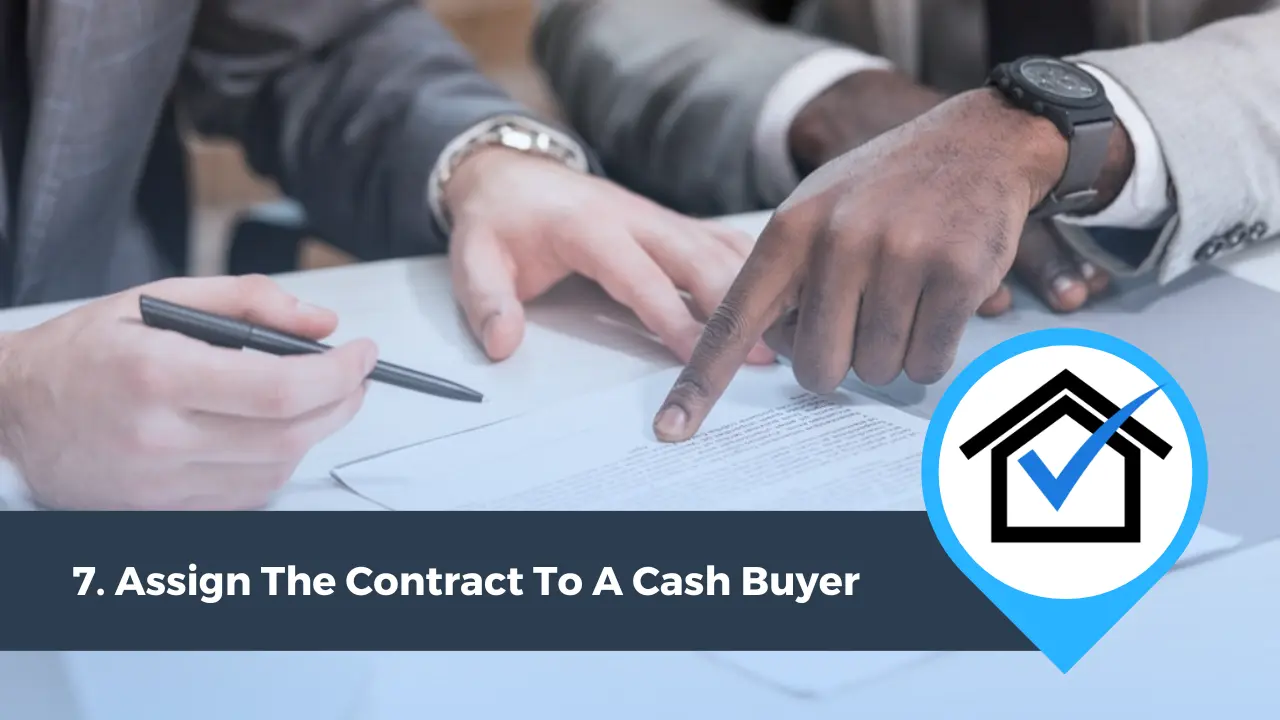
7. Secure An End Buyer From Your Buyers List
Once you’ve put a property under contract, the next step in the wholesale real estate process is finding a qualified end buyer to take over the deal. This is where your cash buyers list (built through consistent networking and marketing) becomes your most valuable asset.
Understand Equitable Interest
Through your purchase agreement, you hold what’s called "equitable interest" in the property. While the seller retains legal title, your contract gives you the right to purchase—and the ability to assign that right to another buyer. This legal standing is what allows wholesalers to profit without ever taking full ownership.
Leverage Your Buyers List
Reach out to the investors, agents, and cash buyers you’ve cultivated. Focus on matching the deal to the right buyer’s criteria—whether they specialize in fix-and-flip projects, rental properties, or land development.
- Email or text blast: Send out a property sheet with photos, key numbers (price, ARV, estimated repairs), and closing timeline.
- Direct calls: Personally call top buyers who can close quickly.
- Investor meetups & REI groups: Present the deal to active investors in your network.
Use an Assignment of Contract
When you’ve found the right buyer, execute an Assignment of Real Estate Purchase and Sale Agreement. This document transfers your contractual rights and obligations to the end buyer in exchange for your assignment fee. Be transparent—share the original purchase agreement, all contingencies, and the exact terms so the buyer knows what they’re agreeing to.
Build Long-Term Relationships
Every smooth transaction strengthens trust with your buyers. Provide accurate information, meet your timelines, and communicate clearly throughout the process. A well-served buyer is far more likely to purchase from you again and refer others.
Think of wholesaling as a relay race: you’ve secured the property and run your leg of the deal. Passing the baton to a capable buyer—quickly and professionally—is how you finish strong, get paid, and set up the next win.

8. Seal The Deal & Get Paid
The final stage of a wholesale real estate transaction is where your planning, negotiations, and networking turn into profit. This is the point where contracts close, funds are transferred, and your wholesale fee hits your account!
Choose Your Wholesale Closing Method
- Assignment of Contract: Transfer your purchase agreement to the end buyer for an agreed-upon assignment fee. This is the simplest, fastest, and lowest-cost method since you never take title to the property.
- Double Closing: You briefly purchase the property, then immediately resell it to your end buyer—often on the same day. While this involves two sets of closing costs, it can protect your privacy and reassure sellers who prefer not to deal directly with your buyer.
- Buy & Resell: Purchase the property outright, then hold and sell it on your timeline. This option offers flexibility but requires more capital and carries higher risk.
Calculate Your Wholesale Fee
Most wholesalers earn 5%–10% of the property’s sale price or a flat amount between $10,000 and $15,000. The key is reverse-engineering your offer:
- Determine the end buyer’s maximum price based on After Repair Value (ARV), repairs, and profit goals.
- Subtract your desired fee.
- The result is your Maximum Allowable Offer (MAO) to the seller.
Using tools like a wholesale real estate calculator can help you validate your numbers before making an offer.
Finalize the Paperwork
Before closing day, confirm that all required documents are complete:
- Executed Assignment of Contract or Purchase Agreement
- Any local/state disclosures
- Title company or attorney closing instructions
- Your wholesale fee clearly listed in the settlement statement
Close and Collect
Once the buyer funds the transaction and the title company disburses payment, your wholesale fee becomes real—whether it’s $5,000 or $50,000. Each closed deal boosts your reputation, making it easier to attract sellers and buyers for future transactions.
*Pro Tip: Document your process after every closing. Track what worked, where you lost time, and how you can improve your next deal. Over time, this will shorten your deal cycle and increase your profits.

What Is An Example Of Wholesaling Real Estate?
Sometimes, wholesaling real estate can sound abstract until you see the numbers and process in action.
Here’s a real-world style example that shows how a wholesaler solves problems for sellers, delivers value to investors, and earns a profit without owning the property.
The Seller’s Situation
Meet Ms. Smith, a long-time homeowner with a property in a great neighborhood but in serious need of updates. She’s emotionally attached to the home, doesn’t want the stress of repairs, and isn’t comfortable listing it publicly. She wants a quick, hassle-free sale.
The Wholesaler’s Solution
As a wholesaler, you research the property and find the After Repair Value (ARV) is about $400,000. Local cash buyers are actively looking for properties in this area. You offer to purchase the home for $250,000, promising a fast, as-is closing. Ms. Smith accepts.
Applying the 70% Rule
- 70% of ARV: $400,000 × 0.70 = $280,000
- Estimated repairs: $60,000
- Maximum Allowable Offer (MAO): $280,000 – $60,000 = $220,000
Because Ms. Smith accepted $250,000, you know there’s still profit potential for an investor willing to pay more than your contract price.
Finding the End Buyer
You market the contract to your buyers list. Within days, an experienced house flipper agrees to buy for $290,000. They see the value in putting in $60,000 of work for a resale potential near $400,000.
Calculating Your Wholesale Fee
- Contract price with seller: $250,000
- Assignment price to investor: $290,000
- Your profit: $40,000—earned without making repairs or taking ownership
The Takeaway
This wholesale real estate example shows how you can:
- Help a motivated seller avoid repairs and delays
- Provide a ready-to-renovate deal to a real estate investor
- Earn a substantial fee for connecting both parties
Wholesaling isn’t just flipping contracts; it’s solving problems, building relationships, and creating win-win transactions in the real estate market.
Read Also: Wholesaling Real Estate: Step-by-Step PDFs [FREE DOWNLOAD]

Pros & Cons of Wholesaling Real Estate
Embarking on a journey in real estate wholesaling? Here's a comprehensive look at the perks and pitfalls you might encounter.
Pros Of Wholesaling Real Estate
- Easy Start: It's an excellent avenue for beginners to step into the real estate world.
- Market Flexibility: Close deals in any market, no matter where you're based.
- Low Initial Costs: Get started with minimal upfront investment, reducing your financial risk.
- Quick Profits: The chance to earn good money in a shorter timeframe.
- Learn as You Earn: Gain insights into the real estate business as you work.
- Independence: Take control of your career trajectory.
- Networking: Develop and expand a list of potential investors over time.
- No Renovations Needed: Avoid the hassle and cost of property fixes and modifications.
Cons Of Wholesaling Real Estate
- Income Stability: Many wholesaling roles are commission-based, meaning no fixed income.
- Research Required: It demands significant legwork to identify the right properties and buyers.
- Learning Curve: It takes time and experience to streamline the process and grow a reliable buyer's list.
- Competition: The growing popularity of wholesaling can intensify the race for quality deals.
- Dependency on Others: Your success is partly tied to property owners' understanding and comfort with the wholesaling concept, as well as investors' readiness to purchase.
- Licensing: Most states don't require licensing, but some states may require one to get into wholesaling.
- Profit Margins: Typically lower than other real estate endeavors, like house flipping.
Read Also: The Pros & Cons Of Wholesaling Real Estate: An Investor's Guide
How To Succeed In Wholesaling: Expert Tips For Beginners
Transforming your aspirations into a thriving real estate career all starts with proper research and education. These expert, wholesale real estate tips will build the foundation for you to succeed:
- Always Consult Your Mentor: Diving into real estate wholesaling can feel overwhelming. Aligning with a seasoned mentor or coach can be a game-changer. They not only provide insights into the intricacies of wholesaling but also guide you through potential pitfalls. Partnering with those possessing a wealth of leads or access to platforms like the Multiple Listing Service can propel your success.
- Establish A Strong Online Presence: In today's digital age, a professional online footprint is paramount. Beyond the conventional business cards, a dedicated wholesale real estate website can boost your credibility. It serves as an information hub for prospects, a platform for lead generation, and a bridge connecting you with potential investors and sellers.
- Adopt A Future-Focused Approach: One successful deal can pave the way for countless others. Recognize the impact of your actions today on tomorrow's opportunities. Always operate with utmost integrity, ensuring you meet or exceed the expectations of all involved parties.
- Champion Transparency: In the world of wholesaling, clarity is king. Ensure your intentions are always transparent. As the saying goes, if you have nothing to hide, you hide nothing.
- Understand The Boundaries: Wholesaling isn't about selling properties, it's about selling contracts. It's essential to grasp that unless you're the property's owner, marketing the real estate requires a license. Instead, focus on marketing your equitable right to buy the property.
- Keep Growing: Personal attributes like goal-oriented thinking, organizational skills, technological affinity, and an eagerness to learn can significantly enhance your wholesaling journey. Remember, each wholesaling experience is a learning opportunity, aiming for a win-win outcome for both sellers and buyers.
Read Also: Wholesaling Real Estate For Beginners: How To Get Started In 8 Steps
How To Start Wholesaling Real Estate In Your Area
The process of wholesaling real estate can vary depending on your market.
Review the comprehensive guides Real Estate Skills has created for your state to get a head start in your market!
Wholesale Real Estate: State-By-State Guides
Tap a state or use the search to open your step-by-step guide.
Browse by State
Tip: Use both the map and this grid for best UX.Wholesaling Real Estate: FAQs
At this point, don’t be intimidated if you have a barrage of questions. From understanding basic concepts to deciphering intricate details, Real Estate Skills is here to help you educate yourself and, ultimately, get you the financial freedom you’ve been striving for!
Whether you're a beginner wholesaler or a seasoned investor looking for a refresher, these most commonly asked questions can provide the clear, concise answers you need!
What Does “Wholesaler” Mean In Real Estate?
In real estate, a wholesaler acts as a middleman. They buy properties at a discount and resell them for a profit, typically one property at a time. Usually, they sell to professionals, like fix-and-flippers, who renovate and prep the property for future residents.
What Is An Assignment Of Contract?
An assignment of contract lets a wholesaler transfer their rights to buy a property to another buyer. It involves three parties:
- Assignor (the wholesaler)
- Assignee (the new buyer)
- Seller (the property's owner)
While contracts often allow these assignments, some may need the seller's consent or disallow assignments.
What Is Double Closing?
Double closing involves two steps: the wholesaler first buys the property and then quickly sells it. They must have funds ready for the first purchase. This method is pricier than the assignment but provides more confidentiality about profits and clear roles in the transaction. Consulting a real estate lawyer is recommended for legal protection.
How Do Real Estate Wholesalers Get Paid?
Real estate wholesalers primarily earn their income through assignment fees in wholesale deals. They don't buy and sell the property themselves; instead, they find a property, secure it under contract, and then assign that contract to a cash buyer for a higher price. The difference between the original contract price and the assignment price is the wholesaler's profit.
Do You Need A License To Wholesale Real Estate?
No, in most real estate markets around the United States, you do not need a license to wholesale real properties. Most states accept the distinction between real estate wholesaling and the role of the real estate agent (or Realtor) acting as a fiduciary when representing a client as a buyer or seller.
That is, except for Illinois, Philadelphia, and Oklahoma, where wholesalers will need to meet licensing requirements to wholesale legally and at scale.
Is Wholesaling Real Estate Legal?
Yes, wholesaling real estate in most locations is a legal and often profitable investment strategy. The key to staying legal is to avoid actions that would rise to the level requiring a state-issued real estate license.
Wholesaling real estate is legal if the wholesaler's actions do not violate real estate laws and licenses. A real estate wholesaler has the legal right to market or to sell their “right to purchase” the property. This legally transferable asset is completely different from selling real estate.
If a real estate wholesaler markets or sells an asset they possess – the ‘equitable interest' in the property, it is a legitimate real estate investment maneuver.
Real estate and license laws vary widely from state to state, so research and understand relevant laws and the customary procedures in your marketplace.
Where Can You Get A Wholesale Real Estate Contract?
Real Estate Skills offers FREE downloadable PDF versions of the wholesale real estate contracts our experts have used time and time again for real estate deals.
A wholesale real estate contract includes a tremendous amount of information that typically includes:
- The property's legal description and mailing address.
- The is given in good faith.
- The seller's item, if applicable.
- The financing terms and other contingencies, to name a few.
When the real estate contract has been fully executed, the wholesaler, who has found an alternate end buyer, can assign their “equitable interest/title” to the new buyer for a fee agreed to by the wholesaler and the end buyer.
To get yourself started today, be sure to download all the wholesale contracts you need straight from us!
Can You Start Wholesaling Houses With No Money?
Yes, you can begin wholesaling houses without investing your own money in the property. Wholesalers connect homeowners with buyers, and it's the buyer who covers the property price and the wholesaler's fee.
However, while you don't need capital for the property, there might be costs for advertising, marketing, and other essentials. Investing in these areas can increase your chances of success in wholesaling.
How Do Real Estate Wholesalers Make Money?
Wholesalers primarily earn through an assignment fee. After locking in a wholesale contract with a seller, they can assign this contract to end buyers, like flippers. The negotiated assignment fee between the wholesaler and the buyer is the wholesaler's main income source.
How Much Money Can You Make Wholesaling Real Estate?
Wholesale earnings vary based on factors like local markets and individual skills. While there's no set salary, The Motley Fool suggests annual incomes can range from $21,500 to $98,500.
Wholesalers typically earn through assignment fees, often 5-10% of the property's price, or a flat fee, which can be around $10,000 to $15,000 per deal. However, these figures are broad estimates, and real incomes can differ.
Read Also: Wholesale Real Estate Salary: How Much Can You Make Wholesaling?
How Hard Is It To Wholesale Real Estate?
Wholesaling real estate can be an attractive investing option, especially for entrepreneurial-minded investors. It offers a streamlined approach with its short-term timeline, low capital needs, and no renovation requirements.
While it simplifies some real estate complexities, success demands dedication and staying within legal boundaries.
Read Also: 17 Best Wholesaling Real Estate Books You Must Read
How do I calculate an assignment fee?
Start with your end buyer’s max price, subtract your MAO, and the difference is your target assignment fee. For a full worksheet that models both flat and percentage fees, use our downloadable spreadsheet on the calculator page.
How accurate is the ARV & MAO calculator?
It depends on your inputs. The tool provides quick estimates; accuracy improves with solid comps and realistic repair assumptions. Always verify numbers with local professionals before making offers.
Is Real Estate Wholesaling Worth It?
If you’re wondering whether wholesaling real estate is worth your time, the answer comes down to one thing: opportunity. Wholesale real estate gives aspiring investors a way to break into the market without needing a large down payment, perfect credit, or years of experience. Instead of waiting on the sidelines, wholesalers learn how to evaluate properties, negotiate deals, and connect buyers—all essential skills for any successful real estate entrepreneur.
What makes wholesaling real estate especially valuable is that it teaches you how to recognize and secure deals—skills that will carry over whether you decide to keep wholesaling, start flipping houses, or build a rental property portfolio. Even if you plan to transition into long-term strategies later, learning how to wholesale houses first can give you the financial foundation and real-world experience you need to grow.
Many of our students have proven just how powerful this strategy can be. Take Chase and Diana, for example—two investors who closed two wholesale deals in California and walked away with $40,000 in profit. They didn’t start with years of experience or deep pockets—just the right training and a willingness to take action.
So, is wholesaling worth it? If you're serious about getting started in real estate and want to create opportunities instead of waiting for them, the answer is a resounding yes.
Final Thoughts On Wholesale Real Estate
Wholesaling real estate might feel overwhelming at first, but with the right training, tools, and mindset, it can be your launchpad into a rewarding real estate career. It’s one of the few investment strategies that offers a low barrier to entry, making it perfect for those with limited capital but big ambitions.
Wholesale real estate allows new investors to build experience, sharpen their deal-making skills, and start earning income—all without owning property. Every successful wholesaler once stood where you are now: at the starting line, fueled by curiosity and the courage to take that first step.
So if you're ready to break into real estate investing, wholesaling could be the smartest way to begin.
If you’re serious about doing your first real estate deal, don’t waste time guessing what works. Our FREE Training walks you through how to consistently find deals, flip houses, and build passive income—without expensive marketing or trial and error.
This FREE Training gives you the same system our students use to start fast and scale smart. Watch it today—so you can stop wondering and start closing.
*Disclosure: Real Estate Skills is not a law firm, and the information contained here does not constitute legal advice. You should consult with an attorney before making any legal conclusions. The information presented here is educational in nature. All investments involve risks, and the past performance of an investment, industry, sector, and/or market does not guarantee future returns or results. Investors are responsible for any investment decision they make. Such decisions should be based on an evaluation of their financial situation, investment objectives, risk tolerance, and liquidity needs.

